 Microsoft ubermensch Bill Gates foresees mobile phones overtaking MP3s as the top choice among portable music players, while dismissing the popularity of Apple’s iPod player as unsustainable.
Microsoft ubermensch Bill Gates foresees mobile phones overtaking MP3s as the top choice among portable music players, while dismissing the popularity of Apple’s iPod player as unsustainable.
“As good as Apple may be, I don’t believe the success of the iPod is sustainable in the long run,” he commented in Frankfurter Allgemeine Zeitung.
“You can make parallels with computers: Apple was very strong in this field before, with its Macintosh and its graphics user interface – like the iPod today – and then lost its position,” Gates added.
Isn’t it just so obvious that Gates hates the success that Apple has found? It drives him crazy. He thought it was going to go away, and has now realised it isn’t.
It’s now clear that Gates and Microsoft are on the attack, gunning for iPod. How do we know that? Well, previously Microsoft used to refer to it in the generic – “Portable music players.”. Now it’s iPod, and Apple are being praised, even if it is damned by faint praise after that. Something tells us that Steve Jobs will be deriving huge pleasure from this.
Apple currently has around two-thirds of the global market for MP3 music players, which can store thousands of songs on compact disk drives or teensy-weensy flash memory chips.
iPods have shifted off the shelves faster than a ferret on a frying pan, with Apple selling more than 5 million iPods in the last quarter.
Apple’s white wonder now faces increasing competition from a mightily miffed Sony who are keen to claw back the dominance it once enjoyed with its iconic Walkman brand, and from mobile phone companies busily integrating MP3 players into handsets
 “If you were to ask me which mobile device will take top place for listening to music, I’d bet on the mobile phone for sure,” Gates told the newspaper.
“If you were to ask me which mobile device will take top place for listening to music, I’d bet on the mobile phone for sure,” Gates told the newspaper.
Sadly for old Billy boy, Microsoft’s smart phones have been overshadowed in the US by Research In Motion Ltd.’s BlackBerry wireless e-mail device, boasting over 3 million units sold so far with a bright future predicted.
The recent release of Windows Mobile 5.0 reflects Microsoft’s determination to become a big noise in the burgeoning market for digital movies, pictures and music and grow beyond its core Windows operating system business.
Gates said that their new Windows Mobile 5.0 – which pops up e-mails on a user’s phone as soon as they arrive – would be a cheaper alternative. “The BlackBerry is great, but we’re bringing a new approach,” he said.
“With BlackBerry, you need to link to a separate server, and that costs extra. With us, the e-mail function will already be part of the server software.”
“Therefore,” he added, before going for the karate-kick killer boast, “I’d venture the prediction that Microsoft will make wireless e-mail ubiquitous.”
 Xbox 360, Microsoft’s successor to their popular Xbox gaming console, will be “unleashed” tonight at a celebrity-packed launch broadcast on MTV, which shows at 8pm in the UK. It was launched on US MTV last night.
Xbox 360, Microsoft’s successor to their popular Xbox gaming console, will be “unleashed” tonight at a celebrity-packed launch broadcast on MTV, which shows at 8pm in the UK. It was launched on US MTV last night.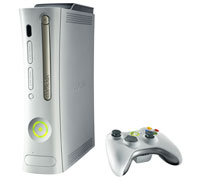 The Xbox will ship with a 12X dual-layer DVD-ROM drive – supporting progressive-scan DVD movies and a host of DVD and CD formats – three USB 2.0 ports, two memory unit slots and support for four wireless game controllers.
The Xbox will ship with a 12X dual-layer DVD-ROM drive – supporting progressive-scan DVD movies and a host of DVD and CD formats – three USB 2.0 ports, two memory unit slots and support for four wireless game controllers. “Xbox 360 marks the beginning of a renaissance in video games,” whooped Don Mattrick, president of Worldwide Studios for Electronic Arts. “The unbelievable Xbox 360 games in development at Electronic Arts will accelerate the industry’s mission to make video games the pre-eminent form of all entertainment.”
“Xbox 360 marks the beginning of a renaissance in video games,” whooped Don Mattrick, president of Worldwide Studios for Electronic Arts. “The unbelievable Xbox 360 games in development at Electronic Arts will accelerate the industry’s mission to make video games the pre-eminent form of all entertainment.”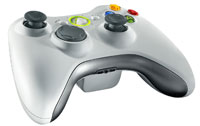 Naturally, gamers love to customise their experience, so there’s a camera option to let vain players add their mugshots into games or even see their friends onscreen as they frag them to an inch of their worthless lives.
Naturally, gamers love to customise their experience, so there’s a camera option to let vain players add their mugshots into games or even see their friends onscreen as they frag them to an inch of their worthless lives. Xbox 360 players can also access recorded TV and digital movies, music, video and photos stored on Windows XP Media Center Edition 2005-based PCs through any Xbox 360 system in the house.
Xbox 360 players can also access recorded TV and digital movies, music, video and photos stored on Windows XP Media Center Edition 2005-based PCs through any Xbox 360 system in the house. Microsoft has unveiled Windows Mobile 5.0, a new version of its Windows operating system for mobile devices.
Microsoft has unveiled Windows Mobile 5.0, a new version of its Windows operating system for mobile devices.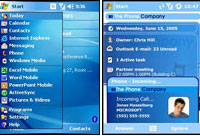 Although the underlying software code remains 90 percent the same as its predecessors, the new Windows Mobile removes some technological distinctions that gave the phone and PDA platforms different capabilities.
Although the underlying software code remains 90 percent the same as its predecessors, the new Windows Mobile removes some technological distinctions that gave the phone and PDA platforms different capabilities. Swivel action business folks will appreciate updates to the mobile versions of Microsoft Word and Excel, with the software providing more consistent formatting of documents created on a computer and allowing charts to be created from a spreadsheet.
Swivel action business folks will appreciate updates to the mobile versions of Microsoft Word and Excel, with the software providing more consistent formatting of documents created on a computer and allowing charts to be created from a spreadsheet.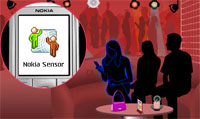 Going up to people and actually introducing yourself has become, like, so uncool with the introduction of the Nokia Sensor Bluetooth widget.
Going up to people and actually introducing yourself has become, like, so uncool with the introduction of the Nokia Sensor Bluetooth widget.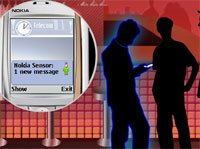 The Sensor app comes with the usual yoof-tastic features, like Buddy Alerts, which tells you if someone you know is nearby (isn’t that what eyes are for?) and ‘Group Codes’ which bleep when someone with similar interests is lurking in the area.
The Sensor app comes with the usual yoof-tastic features, like Buddy Alerts, which tells you if someone you know is nearby (isn’t that what eyes are for?) and ‘Group Codes’ which bleep when someone with similar interests is lurking in the area. The BBC has opened up its RSS news feeds to commercial Websites for the first time, with a new set of terms and conditions letting other sites integrate the BBC feeds for free, and free from offline contractual negotiation.
The BBC has opened up its RSS news feeds to commercial Websites for the first time, with a new set of terms and conditions letting other sites integrate the BBC feeds for free, and free from offline contractual negotiation. Pete Clifton, editor of the BBC News Website said: “Liberating the availability of our content for re-use is an important step for the BBC. We’ve been a bit cautious about it up to now but there’s a real demand for us to provide this service. If we are to build public value it’s important that we respond to this demand.”
Pete Clifton, editor of the BBC News Website said: “Liberating the availability of our content for re-use is an important step for the BBC. We’ve been a bit cautious about it up to now but there’s a real demand for us to provide this service. If we are to build public value it’s important that we respond to this demand.” Yahoo has slapped a king-sized gauntlet on the floor as it announced plans to roll out an aggressively-priced online music service.
Yahoo has slapped a king-sized gauntlet on the floor as it announced plans to roll out an aggressively-priced online music service. Yahoo’s hugely popular Website – visited by 100 million US users every month – should give their music service a big head start, with the company being able to let rip with the kind of massive marketing muscle that few online music rivals can match.
Yahoo’s hugely popular Website – visited by 100 million US users every month – should give their music service a big head start, with the company being able to let rip with the kind of massive marketing muscle that few online music rivals can match. Yahoo’s subscription service will work with selected portable MP3 players that use Microsoft’s digital-music format – there’s currently around compatible 10 devices available, including Dell’s DJ player and Creative Technology’s Zen Micro.
Yahoo’s subscription service will work with selected portable MP3 players that use Microsoft’s digital-music format – there’s currently around compatible 10 devices available, including Dell’s DJ player and Creative Technology’s Zen Micro.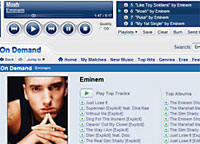 The new service will include free software a la Apple’s iTunes jukebox, with the bonus of letting subscribers rummage around in their friends computers for songs, and then listen to their tracks if the music is part of Yahoo’s catalogue.
The new service will include free software a la Apple’s iTunes jukebox, with the bonus of letting subscribers rummage around in their friends computers for songs, and then listen to their tracks if the music is part of Yahoo’s catalogue.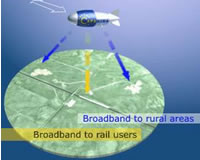 Broadband is taking off everywhere, speeds are increasing and everybody’s happy. Well almost. Broadband isn’t available to all, especially those in more rural areas.
Broadband is taking off everywhere, speeds are increasing and everybody’s happy. Well almost. Broadband isn’t available to all, especially those in more rural areas. Other approaches to HAP involve lightweight aircraft, such as the European-funded Capanina project.
Other approaches to HAP involve lightweight aircraft, such as the European-funded Capanina project.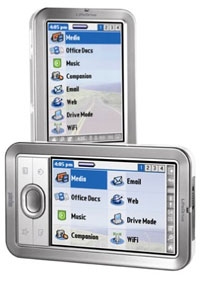 After months of rumours on the Web, details of palmOne’s new LifeDrive PDA have finally shown up on Amazon.
After months of rumours on the Web, details of palmOne’s new LifeDrive PDA have finally shown up on Amazon. NormSoft’s Pocket Tunes is able to play MP3, WMA, Ogg Vorbis, and WAV files and the unit will also support full screen video and photo playback.
NormSoft’s Pocket Tunes is able to play MP3, WMA, Ogg Vorbis, and WAV files and the unit will also support full screen video and photo playback.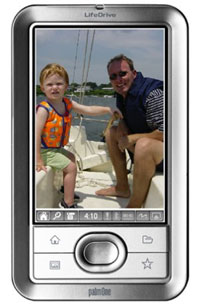 The LifeDrive comes with USB 2.0, so transferring files onto the microdrive should be a fairly nifty business.
The LifeDrive comes with USB 2.0, so transferring files onto the microdrive should be a fairly nifty business. It was a bad weekend for Google as the entire site was rendered unavailable on Saturday night and their new Web Accelerator application drew criticism on privacy and security concerns.
It was a bad weekend for Google as the entire site was rendered unavailable on Saturday night and their new Web Accelerator application drew criticism on privacy and security concerns. Deeply unchuffed, Fried complained that “Google’s Web accelerator can wreak havoc on Web-apps and other things with admin-links built into the UI.”
Deeply unchuffed, Fried complained that “Google’s Web accelerator can wreak havoc on Web-apps and other things with admin-links built into the UI.” Sadly, things went from bad to worse on Saturday night when the world’s leading Internet search engine shut down from 6:45 to 7 p.m. eastern time, with some users experiencing longer outages.
Sadly, things went from bad to worse on Saturday night when the world’s leading Internet search engine shut down from 6:45 to 7 p.m. eastern time, with some users experiencing longer outages. Games developers have included Internet access in their products. The best example of this is Wipeout Pure, which includes a browser, allowing the user to download new game levels and features. Since the game has a browser built-in, it can be reasonable to assume that Sony have actually put all the code to access the Internet in the PSP itself (and made it available to developers).
Games developers have included Internet access in their products. The best example of this is Wipeout Pure, which includes a browser, allowing the user to download new game levels and features. Since the game has a browser built-in, it can be reasonable to assume that Sony have actually put all the code to access the Internet in the PSP itself (and made it available to developers). Rather than everyone set-up spoof servers, some nice people have done it for you, and these then point to a PSP portal which someone has set-up PSP friendly content. You can access the spoof DNS servers by amending your Internet set-up configuration (on the PSP) and leave everything to automatic except for the DNS settings, into which you enter the spoof server settings.
Rather than everyone set-up spoof servers, some nice people have done it for you, and these then point to a PSP portal which someone has set-up PSP friendly content. You can access the spoof DNS servers by amending your Internet set-up configuration (on the PSP) and leave everything to automatic except for the DNS settings, into which you enter the spoof server settings. Once updated versions of the firmware come out, or there are 3rd party applications, the system will have all the features to be a powerful media hub. It supports WiFi, has a decent screen and video capability now, adding other Internet capabilities will just add the finishing touches to a superb product.
Once updated versions of the firmware come out, or there are 3rd party applications, the system will have all the features to be a powerful media hub. It supports WiFi, has a decent screen and video capability now, adding other Internet capabilities will just add the finishing touches to a superb product.